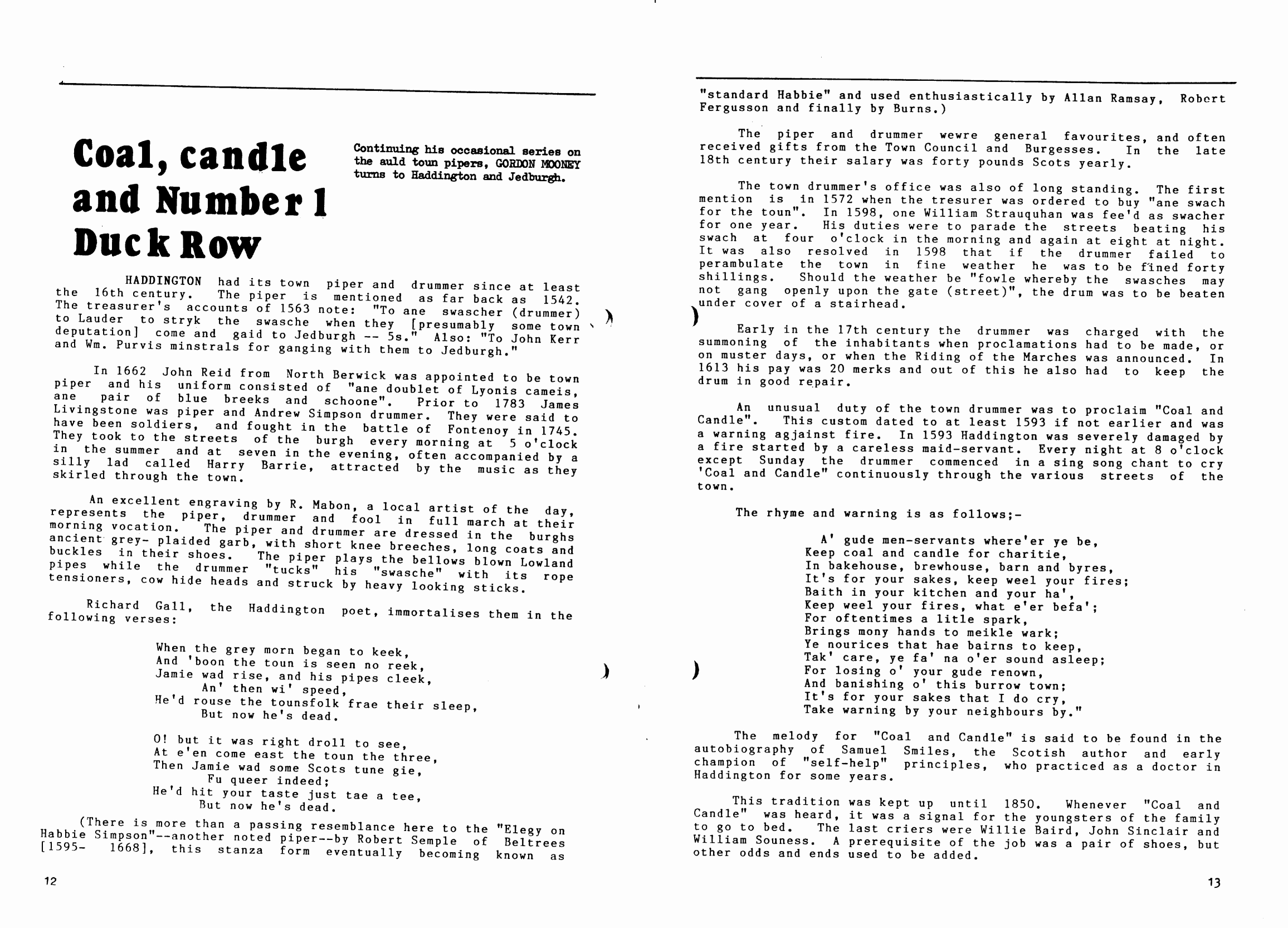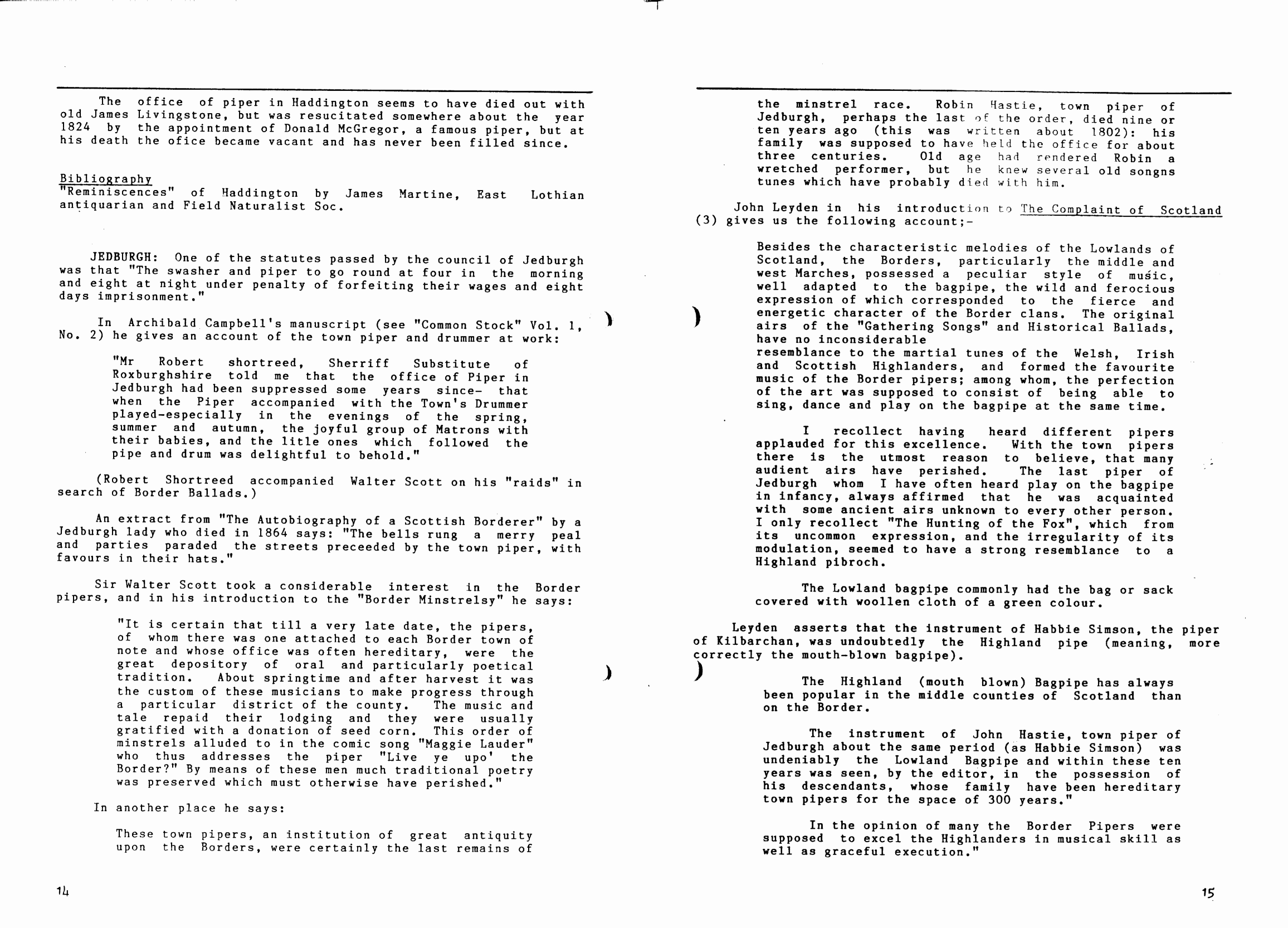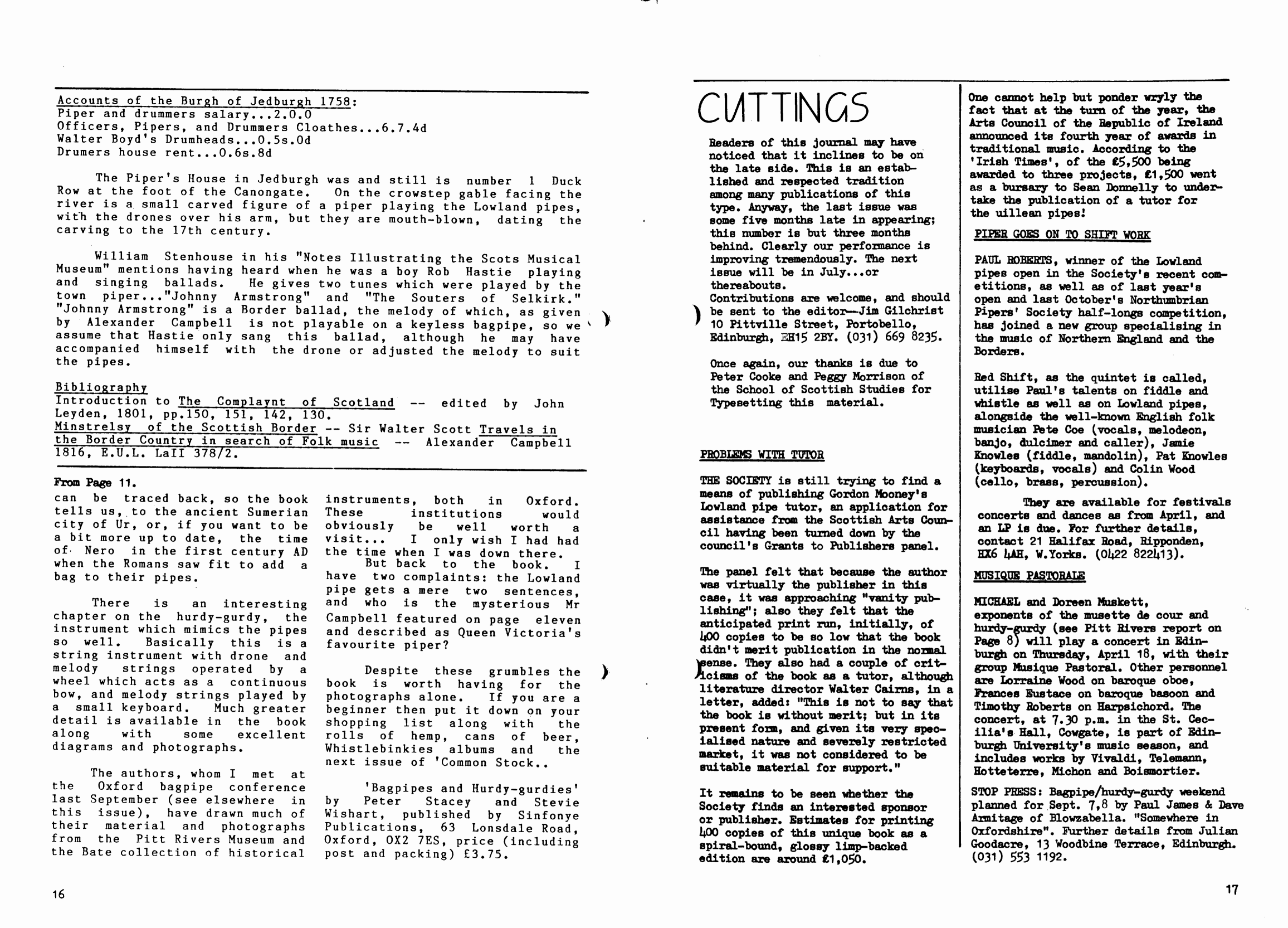Coal, Candle And Number 1 Duck Row
Continuing his occasional series on the auld toon pipers, Gordon Mooney turns to Haddington and Jedburgh
HADDINGTON had its town piper and drummer since at least the 16th century, The piper is mentioned as far back as 1542. The treasurer's accounts of 1563 note: "To ane swascher drummer ) to Lauder to stryk the swasche when they [presumably some town deputation] come and gaid to Jedburgh -- 5s." Also: "To John Kerr and Wm. Purvis minstrals for ganging with them to Jedburgh."
In 1662 John Reid from North Berwick was appointed to be town Piper and his uniform consisted of "ane doublet of Lyonis cameis, ane pair of blue breeks and schoone". Prior to 1783 James Livingstone was piper and Andrew Simpson drummer. They were said to have been soldiers, and fought in the battle of Fontenoy in 1745. They took to the streets of the burgh every morning at 5 o'clock in the summer and at’ seven in the evening, often accompanied by a silly lad called Harry Barrie, attracted by the music as they skirled through the town, An excellent engraving by R. Mabon, a local artist of the day, represents the piper, drummer and fool in full march at their morning vocation, The piper and drummer are dressed in the burghs ancient grey- plaided garb, with short knee breeches, long coats and buckles in their shoes. The piper plays the bellows blown Lowland Pipes while the drummer "tucks" his "swasche" with its rope tensioners, cow hide heads and struck by heavy looking sticks.
Richard Gall, the Haddington poet, immortalises them in the following verses:
When the grey morn began to keek,
And "boon the toun is seen no reek,
Jamie wad rise, and his Pipes cleek,
An' then wi' speed,
He'd rouse the tounsfolk frae their sleep,
But now he's dead.
O! but it was right droll to see,
At e'en come east the toun the three,
Then Jamie wad some Scots tune gie,
Fu queer indeed;
He'd hit your taste just tae a tee,
But now he's dead.
(There is more than a passing resemblance here to the "Elegy on Habbie Simpson"-- ~another noted piper--by Robert Semple of Beltrees (1595- 1668], this stanza form eventually becoming known as "standard Habbie" and used enthusiastically by Allan Ramsay, Robert Fergusson and finally by Burns.)
The piper and drummer were general favourites, and often received gifts from the Town Council and Burgesses. In the late 18th century their salary was forty pounds Scots yearly.
The town drummer's office was also of long standing. The first mention is in 1572 when the tresurer was ordered to buy “ane swach for the toun". In 1598, one William Strauquhan was fee'd as swacher for one year. His duties were to parade the streets beating his swach at four o'clock in the morning and again at eight at night. It was also resolved in 1598 that if the drummer failed to perambulate the town in fine weather he was to be fined forty shillings. Should the weather be "fowle whereby the swasches may not gang openly upon the gate street)", the drum was to be beaten under cover of a stairhead. Early in the 17th century the drummer was charged with the summoning of the inhabitants when proclamations had to be made, or on muster days, or when the Riding of the Marches was announced, In 1613 his pay was 20 merks and out of this he also had to keep the drum in good repair.
An unusual duty of the town drummer was to proclaim "Coal and Candle". This custom dated to at least 1593 if not earlier and was a warning against fire. In 1593 Haddington was severely damaged by a fire started by a careless maid-servant. Every night at 8 o'clock except Sunday the drummer commenced in a sing song chant to cry "Coal and Candle" continuously through the various streets of the town.
The rhyme and warning is as follows;-
A' gude men-servants where'er ye be, Keep coal and candle for charitie,
In bakehouse, brewhouse, barn and byres, It's for your sakes, keep weel your fires;
Baith in your kitchen and your ha', Keep weel your fires, what e'er befa';
For oftentimes a litle spark, Brings mony hands to meikle wark;
Ye nourices that hae bairns to keep, Tak' care, ye fa' na o'er sound asleep;
For losing o' your gude renown, And banishing o' this burrow town;
It's for your sakes that I do cry, Take warning by your neighbours by."
The melody for "Coal and Candle" is said to be found in the autobiography of Samuel Smiles, the Scotish author and early champion of "self-help" principles, who practiced as a doctor in Haddington for some years. This tradition was kept up until 1850, Whenever "Coal and Candle" was heard, it was a signal for the youngsters of the family to go to bed. The last criers were Willie Baird, John Sinclair and William Souness. A prerequisite of the job was a pair of shoes, but other odds and ends used to be added.
The office of piper in Haddington seems to have died out with old James Livingstone, but was resuscitated somewhere about the year 1824 by the appointment of Donald McGregor, a famous piper, but at his death the office became vacant and has never been filled since.
Bibliography: "Reminiscences" of Haddington by James Martine, East Lothian
antiquarian and Field Naturalist Soc.
JEDBURGH: One of the statutes passed by the council of Jedburgh was that "The swasher and piper to go round at four in the morning and eight at night under penalty of forfeiting their wages and eight days imprisonment."
In Archibald Campbell's manuscript (see "Common Stock" Vol. 1, No. 2) he gives an account of the town piper and drummer at work:
"Mr Robert Shortreed, Sherriff Substitute of Roxburghshire told me that the office of Piper in Jedburgh had been suppressed some years since- that when the Piper accompanied with the Town's Drummer played-especially in the evenings of the spring, summer and autumn, the joyful group of Matrons with their babies, and the litle ones which followed the pipe and drum was delightful to behold."
(Robert Shortreed accompanied Walter Scott on his "raids" in search of Border Ballads.)
An extract from "The Autobiography of a Scottish Borderer" by a Jedburgh lady who died in 1864 says: "The bells rung a merry peal and parties paraded the streets preceded by the town piper, with favours in their hats."
Sir Walter Scott took a considerable interest in the Border pipers, and in his introduction to the "Border Minstrelsy" he says:
"It is certain that till a very late date, the pipers, of whom there was one attached to each Border town of note and whose office was often hereditary, were the great depository of oral and particularly poetical tradition. About springtime and after harvest it was the custom of these musicians to make progress through a particular district of the county. The music and tale repaid their lodging and they were usually gratified with a donation of seed corn, This order of minstrels alluded to in the comic song "Maggie Lauder" who thus addresses the piper "Live ye upo' the Border?" By means of these men much traditional poetry was preserved which must otherwise have perished."
In another place he says:
These town pipers, an institution of great antiquity upon the Borders, were certainly the last remains of the minstrel race. Robin Hastie, town piper of Jedburgh, perhaps the last of the order, died nine or ten years ago (this was written about 1802). His family was supposed to have held the office for about three centuries. Old age had rendered Robin a wretched performer, but he knew several old songs and tunes which have probably died with him.
John Leyden in his introduction to The Complaint of Scotland (3) gives us the following account;-
“Besides the characteristic melodies of the Lowlands of Scotland, the Borders, particularly zz middle and west Marches, possessed a peculiar style of music, well adapted to the bagpipe, the wild and ferocious expression of which corresponded to the fierce and energetic character of the Border clans, The original airs of the "Gathering Songs" and Historical Ballads, have no inconsiderable resemblance to the martial tunes of the Welsh, Irish and Scottish Highlanders, and formed the favourite music of the Border pipers; among whom, the perfection of the art was supposed to consist of being able to sing, dance and
play on the bagpipe at the same time.
I recollect having heard different pipers applauded for this excellence. With the town pipers there is the utmost reason to believe, that many audient airs have perished. The last piper of Jedburgh whom I have often heard play on the bagpipe in infancy, always affirmed that he was acquainted with some ancient airs unknown to every other person. I only recollect "The Hunting of the Fox", which from its uncommon expression, and the irregularity of its modulation, seemed to have a strong resemblance to a Highland pibroch.
The Lowland bagpipe commonly had the bag or sack covered with woollen cloth of a green colour”.
Leyden asserts that the instrument of Habbie Simson, the piper of Kilbarchan, was undoubtedly the Highland pipe (meaning, more correctly the mouth-blown bagpipe).
“The Highland (mouth blown) Bagpipe has always been popular in the middle counties of Scotland than on the Border.
The instrument of John Hastie, town piper of Jedburgh about the same period (as Habbie Simson) was undeniably the Lowland Bagpipe and within these ten years was seen, by the editor, in the possession of his descendants, whose family have been hereditary town pipers for the space of 300 years." In the opinion of many the Border Pipers were supposed to excel the Highlanders in musical skill as well as graceful execution."
Accounts of the Burgh of Jedburgh 1758:
Piper and drummers salary...2.0.0
Officers, Pipers, and Drummers Cloathes...6.7.4d
Walter Boyd's Drumheads...0.5s.0d
Drumers house rent...0.6s.8d
The Piper’s House in Jedburgh was and still is number 1 Duck Row at the foot of the Canongate. On the crowstep gable facing the river is a small carved figure of a piper playing the Lowland pipes, with the drones over his arm, but they are mouth-blown, dating the carving to the 17th century.
William Stenhouse in his "Notes Illustrating the Scots Musical Museum" mentions having heard when he was a boy Rob Hastie playing and singing ballads. He gives two tunes which were played by the town piper..."Johnny Armstrong" and "The Souters of Selkirk."
"Johnny Armstrong" is a Border ballad, the melody of which, as given by Alexander Campbell is not playable on a keyless bagpipe, so we assume that Hastie only sang this ballad, or he may have accompanied himself with the drone or adjusted the melody to suit the pipes.
Bibliography
Introduction to The Complaynt of Scotland -~ edited by John Leyden, 1801, pp.150, 151, 142, 130.
Minstrelsy of the Scottish Border -- Sir Walter Scott Travels in the Border Country in search of Folk music --— Alexander Campbell 1816, E.U.L. Lal 378/72.



